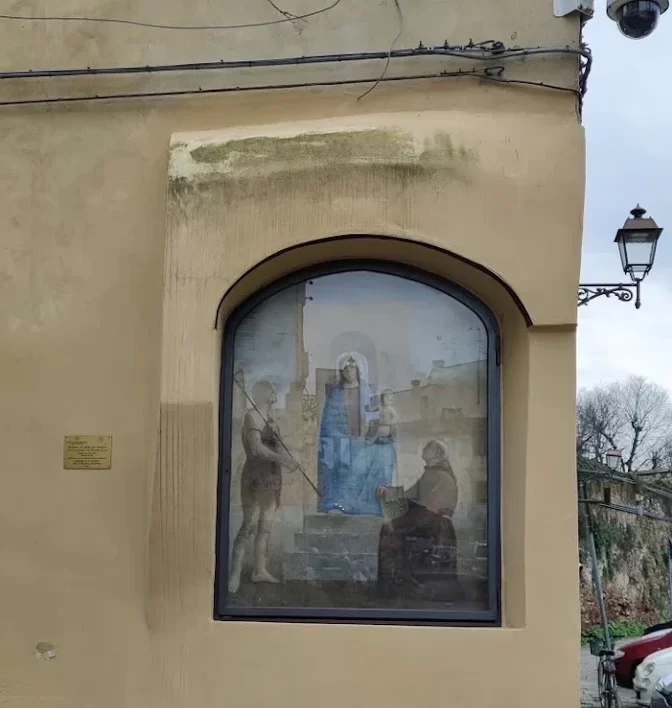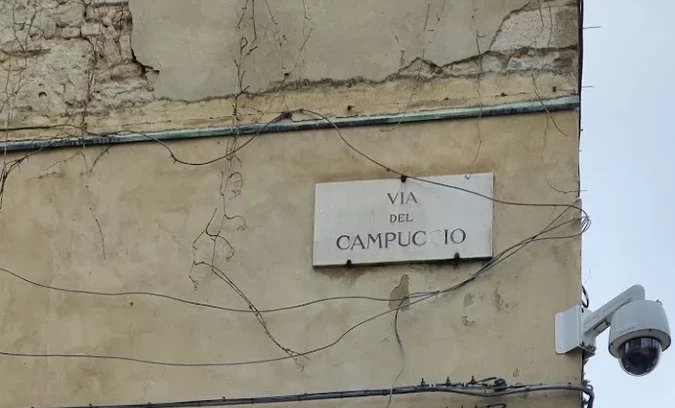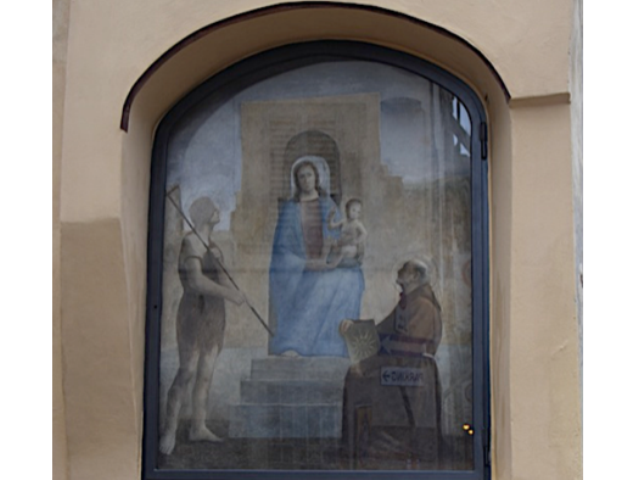Via del Campuccio
corner of Piazza Tasso
corner of Piazza Tasso
the tabernacles of florence
THE TABERNACLE
Madonna in trono col Bambino
The painting in the tabernacle (dry tempera on wall) depicts the Madonna Enthroned with the Blessing Child, framed in an archway beyond which is a glimpse of clear sky. The architecture behind the sacred figures seems to recall one of the city gates or towers, leaving room for a barely noticeable landscape. The Renaissance-inspired composition, with its pyramid of architecture and figures, highlights the figure of the Virgin, underscored by the customary lowered position of the saints at the foot of the tiered podium. The two figures are San Giovanni Battista, standing on the left with the astylar cross and dressed in skins, and San Bernardino of Siena, kneeling on the right with the Signum Christi, his recurring iconographic attribute.
Tabernacle
The tabernacle one encounters when taking Via del Campuccio almost faces Piazza Torquato Tasso: an open space in the heart of a historic district, defined as "an 'urban void, a traumatic and devastating gash [...] in the centuries-old building continuum" (G. Trotta, 1990).
THE STREET
Via del Campuccio
The street extends from Via Romana to Piazza Torquato Tasso. It was originally divided into shorter sections: the first, up to Via de' Serragli, had the name Via San Giovanni, the second Via San Benedetto and then Via della Pergola. The name under which it was later unified probably retains the memory of the vegetable gardens and lands owned by the Camaldolese of the nearby monastery of San Salvatore (see at Piazza Torquato Tasso). The street retains a popular residential character, with many buildings marked by coats of arms and cobblestones that refer to ownership by religious institutions.
AUTHOR
Piero Bernardini
(1891-1974) The painter is best known for his work as an illustrator (or "figurinaio," as he called himself). Engraving, watercolor, drawing, and graphic art in general were in fact his field more than painting; Bernardini won awards for his pictorial production, of which the Pitti Gallery of Modern Art preserves five examples - two self-portraits (one of which he acquired precisely in 1953), a landscape, a portrait and a still life - purchased at local exhibitions or donated by the artist; the gallery also received a donation from the heirs of the family's thick epistolary dating back to World War I, when Bernardini from the military hospital in Cividale sent letters to Florence illustrated by cartoons executed by makeshift means.
The artist
(1891-1974) It was in the world of publishing that the artist gave the greatest proof of his inventive freshness and graphic skill, collaborating on numerous periodicals (from Vamba's "Il giornalino della domenica" to "Emporium"), illustrating such literary cornerstones as Pinocchio and Don Quixote for the types of Italian and foreign publishers, and writing children's books himself. He also exhibited in major graphic design exhibitions, such as the 1914 International Black and White Exhibition. In 1946 he was elected a member of the Academy of Drawing.
Curiosity
While the choice of Battista, patron saint of the city, is easily understandable, on the other hand the choice of the Franciscan saint, who evokes the artist's surname and who a twenty years earlier had been the subject of a lively essay on hagiographic literature by his friend Bargellini, is more peculiar.
OTHER INFORMATION
Info
AMICI DEI MUSEI FIORENTINI ODV - COMITATO PER IL DECORO E IL RESTAURO DEI TABERNACOLI - File by Chiara Sestini - Restorer: Martina Calmanti - Work direction: Daniele Rapino - Restoration by Friends of Florence Foundation (2017)
GALLERY

Tabernacle
Via del Campuccio corner of Piazza Tasso

Plaque
Via del Campuccio

Tabernacle
Via del Campuccio corner of Piazza Tasso



